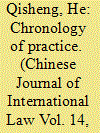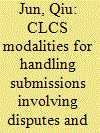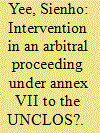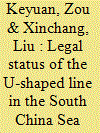|
|
|
Sort Order |
|
|
|
Items / Page
|
|
|
|
|
|
|
| Srl | Item |
| 1 |
ID:
137779


|
|
|
|
|
| Summary/Abstract |
This survey covers materials reflecting the practice of private international law in China in 2013. The survey covers laws, administrative regulations and judicial interpretations that were revised or took effect in 2013. The important specific legal instruments that were affected in 2013 include: the Civil Procedure Law; Trademark Law; Company Law; Regulations of the PRC on the Administration of Foreign-Funded Insurance Companies; Regulations of the PRC on Administration of the Entry and Exit of Foreigners; Reply of the SPC on Whether Maritime Courts May Apply the Small Claims Procedure; Provisions of the SPC on Handling Judicial Assistance Requests for the Service of Judicial Documents, Taking of Evidence in Civil or Commercial Matters in Accordance with International Conventions and Bilateral Treaties on Judicial Assistance; Implementation Rules on “The Provisions of the SPC on Handling Judicial Assistance Requests for the Service of Judicial Documents, Taking of Evidence in Civil or Commercial Matters in Accordance with International Conventions and Bilateral Treaties on Judicial Assistance” (for Trial Implementation); Interpretation (I) of the SPC on Certain Issues Concerning the Application of the “Law of the PRC on Application of Law to Foreign-Related Civil Relations”. This survey also covers cases decided in 2013 in the following areas: proof of foreign law; jurisdiction (exclusive jurisdiction; choice of court agreements; distrainable property, maritime jurisdiction); choice of law (conflicts in current Chinese laws and their solutions, sale contracts, loan and guaranty contracts, equity transfer contracts, export credit insurance contracts, arbitration agreements, employment, maritime matters and intellectual property); foreign judgments; arbitration and foreign awards.
|
|
|
|
|
|
|
|
|
|
|
|
|
|
|
|
| 2 |
ID:
137770


|
|
|
|
|
| Summary/Abstract |
This article reviews the disputed claims submitted to the Commission on the Limits of the Continental Shelf (CLCS) by coastal States and the corresponding actions taken by the Commission to deal with these disputes. Although the Commission has set up its modalities of handling the submission of related disputes, and despite that its decisions have successfully balanced the interests of the States concerned, it might not be capable of handling disputes of a more complicated nature. An example of a complicated dispute is the submissions involving the region of the South China Sea which contain land territory sovereignty disputes, maritime boundary delimitation disputes, as well as disputes in regards to the interpretation and application of the UNCLOS. Compared with most other submissions, the disputes associated with the South China Sea are obviously more complex. We, therefore, conclude that it is more appropriate for the Commission to not consider or qualify these submissions, rather than to defer their consideration.
|
|
|
|
|
|
|
|
|
|
|
|
|
|
|
|
| 3 |
ID:
137765


|
|
|
|
|
| Summary/Abstract |
Intervention in an international proceeding is only permissible with the consent of the parties to a case, expressed either as a general consent for a certain category of matters or as a specific consent for a particular case or a particular request for intervention. Treaty practice demonstrates this point. The UNCLOS, including Annex VII, does not contain such consent (more in terms of general consent if at all) to intervention in an Annex VII arbitral proceeding, although intervention is possible by separate consent if given by the parties in an act additional to the UNCLOS. Article 5 of Annex VII authorizing rule-making does not extend so far as to allow an Annex VII arbitral tribunal to make, without the consent of the parties, a rule that would permit intervention. Nor does such a tribunal have any inherent power or jurisdiction—independent of the consent of the parties in a case—that would allow it to permit intervention without the consent of the parties. Any innovation in this area will bring great harm to the institution of international arbitration under the UNCLOS and generally.
|
|
|
|
|
|
|
|
|
|
|
|
|
|
|
|
| 4 |
ID:
137767


|
|
|
|
|
| Summary/Abstract |
Moving from the assumption that judicial abdication in foreign affairs represents a major hurdle to domestic implementation of international law (and thus to its effectiveness), the present article investigates its legal and prudential foundations, having particular regard to the political question doctrine (or political act doctrine, in civil law parlance). A comparative analysis reveals the threefold nature of these doctrines, to the extent that they operate either as a jurisdictional limitation, or as a non-justiciability argument, or as a form of prudential self-restraint. Each of these aspects will be discussed in detail in order to demonstrate a) that all the arguments employed to justify judicial abdication are devoid of grounds or overestimated; and b) that more viable solutions are available with a view to balancing judicial control and political prerogatives in foreign affairs cases.
|
|
|
|
|
|
|
|
|
|
|
|
|
|
|
|
| 5 |
ID:
137763


|
|
|
|
|
| Summary/Abstract |
The U-shaped line in the South China Sea has been recently challenged in the international community and this challenge reached its climax when the Philippines presented China with a Notification and Statement of Claim under Article 287 and Annex VII of the 1982 United Nations Convention on the Law of the Sea (LOS Convention) on 22 January 2013. In its Statement of Claim, the Philippines requests the Annex VII Arbitral Tribunal to adjudge and declare that China's maritime claims based on the U-shaped line are contrary to the LOS Convention and invalid. Against this background, this article will analyze the issues concerning the related submissions of the Philippines.
|
|
|
|
|
|
|
|
|
|
|
|
|
|
|
|
| 6 |
ID:
137760


|
|
|
|
|
| Summary/Abstract |
A major opportunity exists for international law to engage at the conceptual heart of development, in the phase where broad principles and rights are implemented by States and other development actors. This would involve, principally, a more advanced institutional framework to refine and integrate the broad principles, as well as methods of enforcement to protect development rights and hold the various actors accountable. In addition, international law can and should do more to focus the resources of the international community on the issue of development, which would help to fortify the world's resilience to disasters and other emergencies.
|
|
|
|
|
|
|
|
|
|
|
|
|
|
|
|
| 7 |
ID:
137777


|
|
|
|
|
| Summary/Abstract |
As vulnerable marine ecosystems, submarine ridges and seamounts in the Pacific Region of Chile are internationally protected, particularly from destructive fishing practices. This is the consequence of a number of legal instruments and measures reflecting an international practice, which have constituted an opinio juris to which countries may appeal to bring protection to such submarine features and ecosystems. However, in such a region the outer continental shelf, although still pending in its delineation, is an area over which eventual disagreements may arise between Chile and third States concerning the scope of conservation measures applicable in those vulnerable ecosystems and to the living marine resources therein. In applying precautionary and ecosystem approaches, Chile is entitled to claim protection to such ecosystems and resources. The entry into force of amendments to the Chilean Law of Fisheries, in which both the precautionary and ecosystem approaches, along with the environmental assessment to vulnerable marine ecosystems, were adopted, contributes to such a claim. Besides, the South Pacific RFMO provides room to extend the environmental protection to areas beyond national jurisdiction.
|
|
|
|
|
|
|
|
|
|
|
|
|
|
|
|
| 8 |
ID:
137761


|
|
|
|
|
| Summary/Abstract |
Hedley Bull's theory of international relations has widely been treated as of central importance within the international relations discipline. Yet, Bull's theory is inherently interdisciplinary, not least because the basic elements it operates with, such as “international society” and “international order”, inevitably draw on the factors and considerations that constitute the legitimate object of the discipline of international law. Thus, the proper understanding and evaluation of the genuine importance of Bull's theory requires an inter-disciplinary analysis that is being undertaken here for the first time, in order to understand the genuine essence of his theory as well as the implications of it for the practical aspects of both law and politics in international affairs.
|
|
|
|
|
|
|
|
|
|
|
|
|
|
|
|
|
|
|
|
|